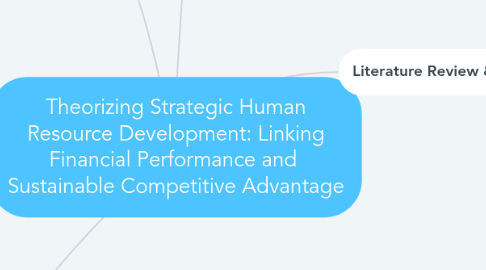
1. Strategic HR and Strategic HRD
1.1. Organizational Strategic HRD as a systematic process of developing strategic human resources
1.1.1. Talent development
1.1.2. Training and development
1.1.3. Organization development
1.1.4. Performance development
1.1.5. Leadership development
1.2. Individual Strategic HRD
1.2.1. a systematic process of developing individual human expertise in order to enable individual to achieve his/her strategic objectives
1.3. National Strategic HRD
1.3.1. a systematic process of developing strategic human resources in order to enable the nation (society) to achieve its strategic objectives
2. Implications
2.1. New definition and model of Strategic HRD has clear linkages between HRD approaches and organizational strategic results
2.2. the new model promotes the status quo of HRD and HRD professionals in the organization
2.3. the new definition considers HRD at organizational level, as well as individual and national (societal) levels
2.4. the new model of Strategic HRD is built on the resource-based view of firm and HR.
3. Objective
3.1. To explore potential new underlying theory and model of strategic HRD
4. Literature Review & Critique
4.1. Performance Paradigm
4.1.1. Process of developing and/or unleashing human expertise through organization development (OD) and personnel training and development (T&D) for the purpose of improving performance.
4.1.1.1. clearly points out the purpose of HRD policies and programs is to improve organizational performance through the process of T&D, OD, and career development.
4.1.1.2. systematically discourses the relationship between theoretical foundations of HRD and other prominent disciplines
4.1.1.3. a good buy-in position for the practitioners in HRD especially in T&D, OD, and career development areas.
4.1.1.4. Merely regards human factors as capital investment into the system and produces value-added performance in the form of goods and services
4.1.1.5. Not well sounded at individual and national (societal) level
4.2. Learning Paradigm
4.2.1. HRD is the study and practice of increasing the learning capacity of individuals, groups, collectives and organizations through the development and application of learning-based interventions for the purpose of optimizing human and organizational growth and effectiveness
4.2.1.1. Reflective learning, experiential learning, transformative learning, and social learning have firmed occupied the stage of human resource development both in research and practice
4.2.1.2. Domains of learning concepts are too broad and too liberal for individual purpose of learning and growth.
4.2.1.3. the “terms” of various learning concepts and learning instruments have not been effectively communicated with practitioners and business decisionmakers yet
